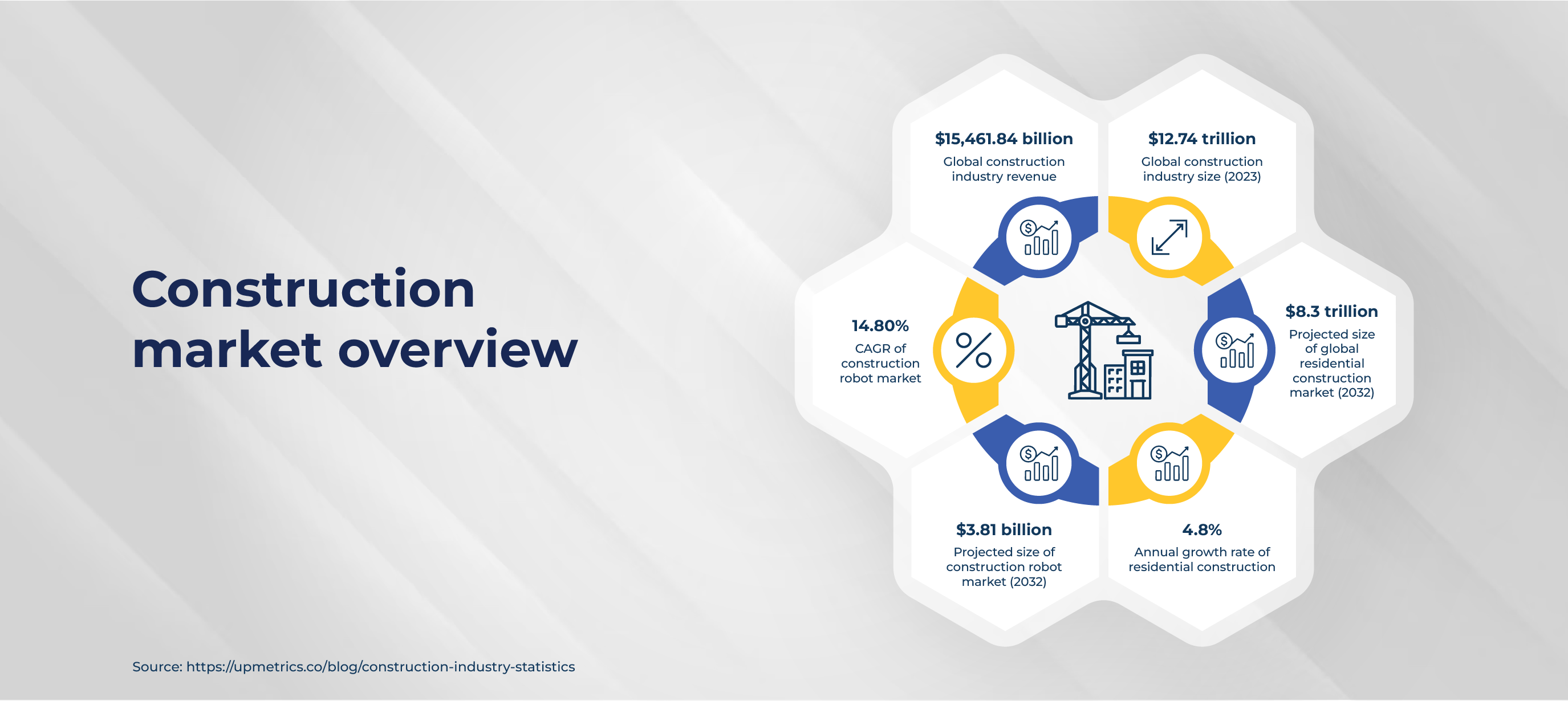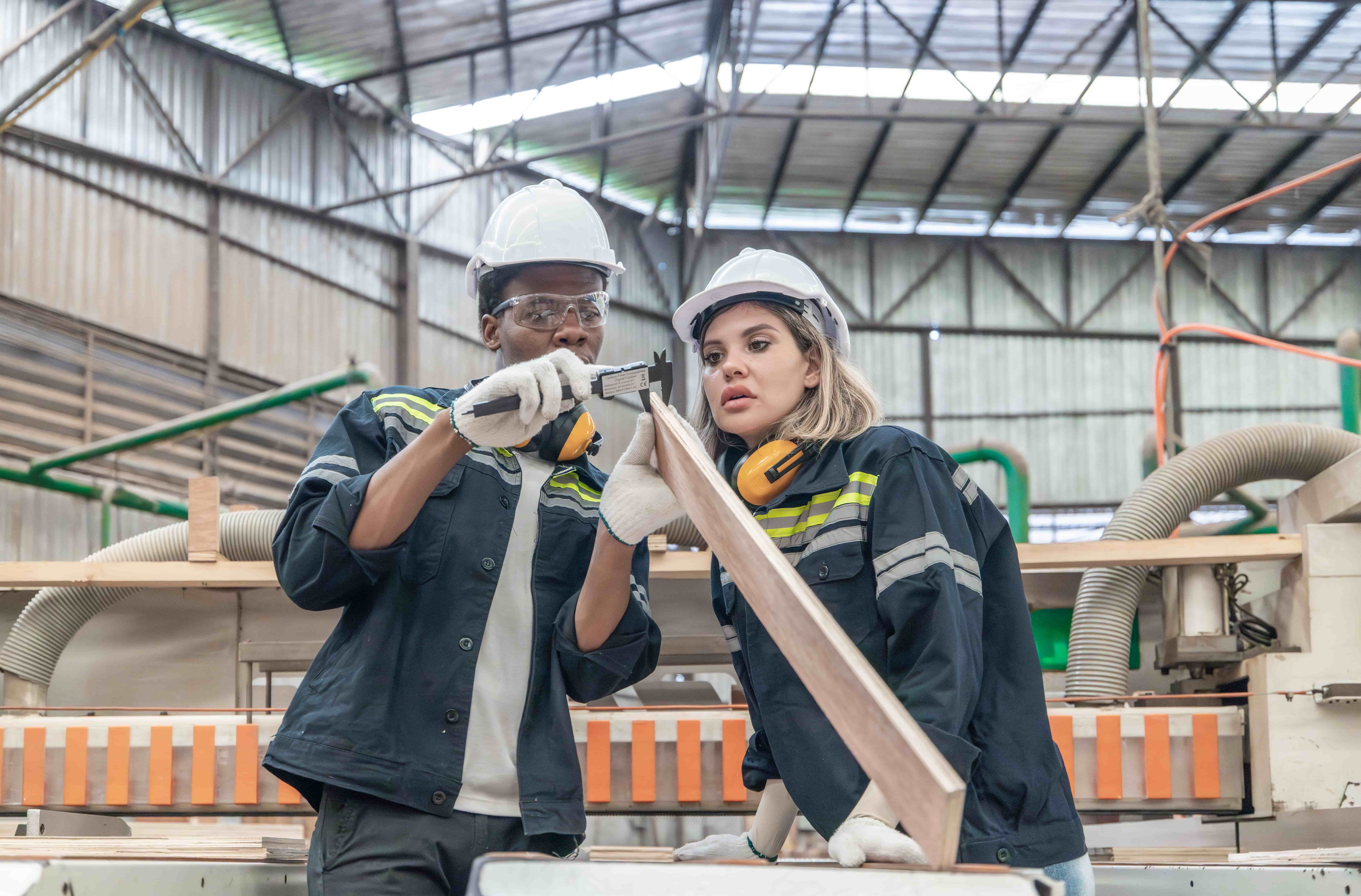
7 technology trends impacting the construction industry
Get ready to explore technologies that are reshaping the construction industry. From generative artificial intelligence (AI) and 3D printing to robotics and digital twins, discover how innovation is building a smarter, faster and more sustainable world.
The construction industry is experiencing rapid transformation as new technologies reshape how projects are planned, executed and managed. These innovations are not only enhancing productivity and safety but also paving the way for a more sustainable and efficient future.
As the construction sector expands globally, individuals with advanced qualifications, such as a higher national diploma (HND) in construction management, will be well-positioned to take advantage of this growth.
The following are seven construction technology trends that are driving the future of construction industry.
Table of Contents
- Introduction
- Artificial intelligence
- 3D printing and additive manufacturing
- Building Information Modelling (BIM)
- Drones and aerial data collection
- Robotics and automation
- Augmented Reality (AR) and Virtual Reality (VR)
- Digital twins and IoT integration
- The future of construction technology
- FAQs about the future of construction technology
1. Artificial intelligence

We are surrounded by artificial intelligence, whether it is in education, creative industry or in the construction sector.
AI-powered solutions support sustainability efforts by optimising resource use and ensuring regulatory compliance, making them essential for the future of construction technology.
The applications of this technology in construction are diverse and can be applied to:
- Various aspects of design and architecture, including automated design generation, 3D modelling and visualisations
- Detect building code violations and suggest changes
- Site planning and optimisation
- Compliance checking and suggestion
The use of these AI-powered tools and generative AI helps building companies increase efficiency, prevent costly issues, ensure compliance with regulatory requirements and contribute to sustainability.
2. 3D printing and additive manufacturing
3D printing in construction is changing the fate of the industry by allowing builders to ‘print’ three-dimensional objects layer by layer from a digital file. The use of this method allows structures to be built in less time and energy. In fact, it is possible to construct an entire building within a few days. In addition to parts and components, 3D technology also supports the creation of major structures such as skyscrapers, bridges and homes.
Additive manufacturing appeals to both government and private construction organisations because it helps minimise project schedules, cut labour costs, maximise material resources and eliminate waste. Using this technology reduces material waste, accelerates project timelines and allows complex, customised designs to be created. On-site 3D printing also addresses supply chain challenges, making it a key player in the future of construction technology.
3. Building Information Modelling (BIM)
One of the more recent developments in construction management is building information modelling. With this, users can access a comprehensive 3D model of a building in a virtual setting, including all its structures and parts. It has been used successfully in complex construction projects, in particular. It allows for the creation of realistic construction project schedules based on the data, the timely detection and correction of errors at the design stage. This helps in the comprehensive understanding of functional and physical characteristics.
Moreover, by combining these tools with AI and the Internet of Things (IoT), construction project teams will be able to collaborate better and obtain more actionable insights.

With the rapid adoption of technologies such as BIM and 3D printing, professionals who are proficient in these tools are in high demand. The HND in Construction Management at GBS Dubai places special emphasis on these innovations, ensuring graduates are well prepared for the workforce.
4. Drones and aerial data collection
The construction sector is undergoing a change because of drones and aerial data collection, which provide real-time information, increase efficiency and improve safety.
Drones allow for more precise project planning, progress tracking and problem diagnosis by taking high-resolution photos and 3D models of building sites. This results in shorter project schedules, quicker decision-making and lower costs.
Drones also help overcome access challenges and improve efficiency, especially on larger or complex sites. With advanced sensors such as LiDAR and GPS, drones create detailed maps and volumetric data faster than traditional methods.
5. Robotics and automation
Robotics streamline repetitive and hazardous tasks, such as bricklaying, material handling and field layout. Automation boosts productivity, improves safety and addresses labour shortages by taking over physically demanding jobs, allowing human workers to focus on high-value activities.
The use of automated technology, as opposed to conventional building methods, can also reduce the number of accidents on construction sites, particularly while performing risky activities or working in hazardous conditions. Additionally, using robotics and automation raises the quality of the work produced.
As a result, it is anticipated that automation and robotics will advance (more cobots and humanoids will be deployed) and become widely used in 2025 and beyond.
6. Augmented Reality (AR) and Virtual Reality (VR)
AR and VR technologies enhance project visualisation and collaboration. AR overlays digital information onto the physical world, helping teams detect design errors and visualise BIM data in real-time. VR allows stakeholders to experience immersive project walkthroughs before construction begins, improving client engagement and reducing costly changes.
GBS Dubai’s HND in Construction Management places special emphasis on construction technology, helping students stay updated on recent trends and developments. The Pearson-approved programme also provides students with real-world exposure and practical learning experiences.
7. Digital twins and IoT integration
Digital twins are dynamic digital replicas of physical assets, integrating data from IoT sensors to monitor real-time conditions like energy usage, occupancy and structural health. Using this technology, buildings can be made more efficient and environmentally friendly through predictive maintenance, operational optimisation and lifecycle management.
In the coming year 2025-26, Digital Twins will be fully used in construction projects, allowing professionals to simulate, track and improve building performance using real-time data and AI.
The future of construction technology

Builders and contractors are delivering smarter and more efficient buildings as these technologies are adopted more widely. These trends are not just futuristic concepts; they are actively shaping the construction industry today. Companies are now using advanced tools such as software, sensors, drones and other technologies deliver better results, and this trend is expected to grow further in 2025 and beyond.
As construction projects become more complex, digitalisation offers many benefits, including increased efficiency, accurate planning and visualisation, real-time collaboration and better safety on site. The future of construction technology promises smarter buildings, safer sites and a more connected construction ecosystem.
Professionals who upskill in these areas are in high demand. GBS Dubai offers programs such as the HND in Construction Management that provide students with both fundamental knowledge and hands-on experience to enable them to remain competitive in this rapidly changing field.
FAQs about the future of construction technology
The construction industry has undergone numerous developments. It includes 3D construction, virtual/augmented reality (VR/AR), building information modelling (BIM), drones, and other technologies. These future technologies are designed for efficiency and sustainability.
Based on existing records, the construction industry is growing rapidly and is expected to reach $16.1 trillion by 2030 from $10.4 trillion in 2023, with a CAGR of approximately 5.9%2% over this period. This indicates the potential growth potential of the construction industry.
Construction management covers the entire lifecycle of a construction project, from initial planning and design to final completion and handover. It involves overseeing key elements such as budgeting, scheduling, quality assurance, risk mitigation and ensuring that the project aligns with the client's expectations. After studying construction management, graduates can pursue various roles such as:
- Construction project manager
- Site engineer
- Cost estimator
- Facilities manager
Yes, construction management has a strong future. The field is growing fast due to high demand in the construction industry and the use of new technologies that solve complex problems more efficiently.
To study construction management in Dubai, you can enrol on the HND in Construction Management programme at GBS Dubai. This two-year programme provides an in-depth knowledge of construction technology, sustainable construction methods, advanced construction drawing and detailing and a number of other skills. It equips students with the most relevant industry knowledge and trends, ultimately helping them build a successful career in the sector.
Browse our courses
GBS Dubai offers a wide range of industry-focused education courses, designed to fit around your busy schedule.